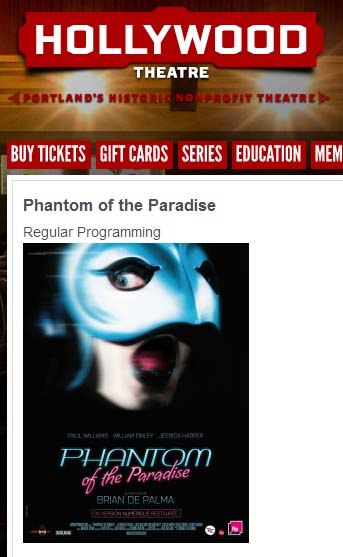 Sorry for the late notice, but Brian De Palma's Phantom Of The Paradise will be screened from DCP at 9:40 tonight at the Hollywood Theatre in Portland. It also screened there last night-- apologies again, if you're in the area and didn't know.
Sorry for the late notice, but Brian De Palma's Phantom Of The Paradise will be screened from DCP at 9:40 tonight at the Hollywood Theatre in Portland. It also screened there last night-- apologies again, if you're in the area and didn't know.
 Hello and welcome to the unofficial Brian De Palma website. Here is the latest news: |
|---|
E-mail
Geoffsongs@aol.com
-------------
Recent Headlines
a la Mod:
Listen to
Donaggio's full score
for Domino online
De Palma/Lehman
rapport at work
in Snakes
De Palma/Lehman
next novel is Terry
De Palma developing
Catch And Kill,
"a horror movie
based on real things
that have happened
in the news"
Supercut video
of De Palma's films
edited by Carl Rodrigue
Washington Post
review of Keesey book
-------------
Exclusive Passion
Interviews:
Brian De Palma
Karoline Herfurth
Leila Rozario
------------
------------
| « | July 2015 | » | ||||
| S | M | T | W | T | F | S |
| 1 | 2 | 3 | 4 | |||
| 5 | 6 | 7 | 8 | 9 | 10 | 11 |
| 12 | 13 | 14 | 15 | 16 | 17 | 18 |
| 19 | 20 | 21 | 22 | 23 | 24 | 25 |
| 26 | 27 | 28 | 29 | 30 | 31 | |
De Palma interviewed
in Paris 2002
De Palma discusses
The Black Dahlia 2006

Enthusiasms...
Alfred Hitchcock
The Master Of Suspense
Sergio Leone
and the Infield
Fly Rule
The Filmmaker Who
Came In From The Cold
Jim Emerson on
Greetings & Hi, Mom!
Scarface: Make Way
For The Bad Guy
Deborah Shelton
Official Web Site
Welcome to the
Offices of Death Records
 Sorry for the late notice, but Brian De Palma's Phantom Of The Paradise will be screened from DCP at 9:40 tonight at the Hollywood Theatre in Portland. It also screened there last night-- apologies again, if you're in the area and didn't know.
Sorry for the late notice, but Brian De Palma's Phantom Of The Paradise will be screened from DCP at 9:40 tonight at the Hollywood Theatre in Portland. It also screened there last night-- apologies again, if you're in the area and didn't know.
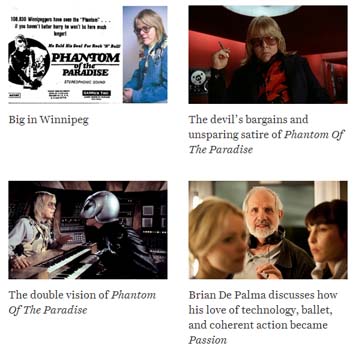 After almost two years online, The Dissolve posted a farewell editorial on July 8, by founder and chief editor Keith Phipps (today would have marked the site's two-year anniversary). In the editorial, Phipps made it clear there is no one to blame for the shut-down, other than the "various challenges inherent in launching a freestanding website in a crowded publishing environment, financial and otherwise." Here at De Palma a la Mod, we will miss The Dissolve, not just because the site's talented group of writers were consistent proponents of the work of Brian De Palma, but also for the consistently engaging devotion to cinephilia that bled from the digital pages those writers regularly produced.
After almost two years online, The Dissolve posted a farewell editorial on July 8, by founder and chief editor Keith Phipps (today would have marked the site's two-year anniversary). In the editorial, Phipps made it clear there is no one to blame for the shut-down, other than the "various challenges inherent in launching a freestanding website in a crowded publishing environment, financial and otherwise." Here at De Palma a la Mod, we will miss The Dissolve, not just because the site's talented group of writers were consistent proponents of the work of Brian De Palma, but also for the consistently engaging devotion to cinephilia that bled from the digital pages those writers regularly produced."With Passion, De Palma is on more familiar ground, using the world of the erotic thriller to note how Skyping, sexting, and tiny pocket cameras are changing behavior, putting everyone in the spotlight and distracting the eye. That’s ultimately what makes Passion a more effective film than the one it’s remaking. While Corneau and Carter were telling a story about what their characters do and don’t see, De Palma is more engaged with what the audience sees. There’s always something to look at in the background of Passion, from the erotic paintings on the walls of Christine’s flat to the video billboards posted around Berlin, and always something eye-catching in what the characters wear, or how they’re posed. The movie is one long game of misdirection, playing tricks on viewers from scene to scene, and showing how easy it is to steer a crowd into missing something important. That’s the real De Palma touch, even more than the operatic overtones and excess."
Scott Tobias interviews Brian De Palma about Passion
The Dissolve: Does it frustrate you as a filmgoer to see the language of a film employed less carefully than that? All that work is elided in a lot of movies.
De Palma: Yes, I would agree. I’m astounded by—whether you’re making a science-fiction movie, a zombie movie, a Star Trek, a Marvel Comics Spider-Man movie—these action sequences that seemingly go on endlessly, without any type of shape or form. So much in action has to do with choreography, and orienting the viewer in where everything is. And I’m amazed all the time that nobody seems to pay much attention to that. So you basically get action and reaction, and it’s like an endless drumming without any shape.
The Dissolve: It seems like they’re trying to make up in sheer, visceral force things that could be done much more elegantly.
De Palma: And obviously, in order to have a crescendo, you have to have some silence. It’s just so simple, but nobody seems to pay much attention to it. They’re basically banging at you constantly. And then in a movie, it’s two hours, too, and then everybody says, “My God, when is this going to be over?” [Laughs.]
Noel Murray's Favorite Scene of 2013: Afternoon Of A Faun, Passion
"Brian De Palma’s Passion starts out as a fairly flat and faithful adaptation of Alain Corneau’s Love Crime, but then after about half an hour, De Palma loosens up and starts making his most visually expressive and delightfully delirious movie since Femme Fatale. In Passion’s best sequence—and one of the best setpieces of De Palma’s formidable career—a ruthless businesswoman played by Rachel McAdams is stalked by a killer on half the screen, while the other half shows her protégée (Noomi Rapace) watching a performance of The Afternoon Of A Faun. The score rises to a peak, and the dancers look directly into the camera, underlining Passion’s theme of misdirection. De Palma keeps pulling viewers’ eyes back and forth, while heightening the tension to the point of distraction. He also calls back to some of his earliest films, like Dionysus In ’69 and Hi, Mom!, where the theater played a central role. Passion isn’t one of De Palma’s top-tier films, but it’s playful and creative, and the Afternoon Of A Faun sequence is a model of how to layer images and move characters with a multiple frames."
Alan Jones investigates why Phantom Of The Paradise was/is Big In Winnipeg
"Regardless, it became a weekly ritual for young Winnipeggers, playing into May of the following year, and encouraging repeat visits. A columnist for the Winnipeg Free Press claimed he had met many people who had seen it 13 or 14 times. 'In many ways, it was almost like a big rock ’n’ roll party for us,' says Carlson. 'At that age, the most subversive thing we might have seen would have been Herbie Goes To Monte Carlo or something.' Perhaps the permissiveness of Winnipeg parents played a role in Phantom’s success, but the film may have also been a generation’s introduction to rock ’n’ roll. For this audience, Williams’ glam rock played as the real thing, their first introduction to 'adult' music, a ripe starting point for a film and musician whose reputation within the city grew with nostalgia and age."
The double vision of Phantom Of The Paradise by Noel Murray
(Thanks to Drew!)
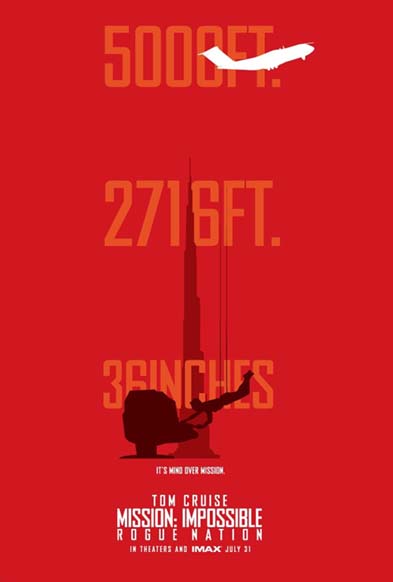 This new poster for Mission: Impossible Rogue Nation appeared today on sites such as imgur, Reddit, and Flickering Myth. The source is said to be Tom Cruise's Twitter page, although I don't see it there... In any case, the poster makes an obvious nod to the first film in the series, which was directed by Brian De Palma.
This new poster for Mission: Impossible Rogue Nation appeared today on sites such as imgur, Reddit, and Flickering Myth. The source is said to be Tom Cruise's Twitter page, although I don't see it there... In any case, the poster makes an obvious nod to the first film in the series, which was directed by Brian De Palma.
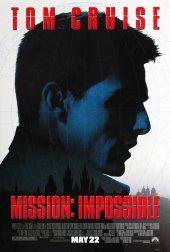 The Now Playing Podcast is looking at each Mission: Impossible film, in anticipation of the fifth film in the franchise, which will open in theaters at the end of July. A couple of weeks ago, they began the series with the initial film from 1996, directed by Brian De Palma. Overall, the group feels that while the film has "problems," they found a lot to like and mildly recommend it. "The problem," according to one of the podcast's three hosts, "is the movie wants to be so coy all the time, it wants to surprise you, that it leaves out too much information, and you end up having to piece things together from not enough footage." If, like me, you don't actually see a problem here, get ready for a trying 84-minute discussion bogged down with comments about how "it would have been easy to fix that" in the script, along with an incessant need to have everything spelled out for the viewer.
The Now Playing Podcast is looking at each Mission: Impossible film, in anticipation of the fifth film in the franchise, which will open in theaters at the end of July. A couple of weeks ago, they began the series with the initial film from 1996, directed by Brian De Palma. Overall, the group feels that while the film has "problems," they found a lot to like and mildly recommend it. "The problem," according to one of the podcast's three hosts, "is the movie wants to be so coy all the time, it wants to surprise you, that it leaves out too much information, and you end up having to piece things together from not enough footage." If, like me, you don't actually see a problem here, get ready for a trying 84-minute discussion bogged down with comments about how "it would have been easy to fix that" in the script, along with an incessant need to have everything spelled out for the viewer.
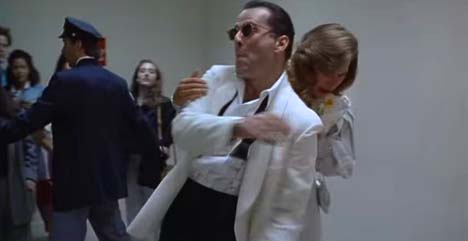
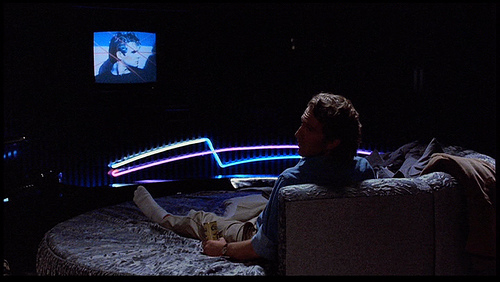 Brian De Palma's Body Double is on the schedule for the Sony Movie Channel this month including a showing Saturday night), while over on MGM-HD, De Palma's Blow Out is programmed throughout this holiday weekend.
Brian De Palma's Body Double is on the schedule for the Sony Movie Channel this month including a showing Saturday night), while over on MGM-HD, De Palma's Blow Out is programmed throughout this holiday weekend."It is difficult to label any one film industry, from its conception to its present day stature, as the greatest of all time. Many, however, would argue that Hollywood has maintained its status as the most extravagant. From the silent spectacles of the roaring twenties to the technicolor marvels of the 1950's, American cinema has always possessed a distinct opulence, a resounding declaration of stature and celebrity. The formula is most commonly associated with Alfred Hitchcock: a leading man, a beautiful woman by his side, and an gaudily enigmatic conflict designed to bewilder audiences far and wide. Thirty years after what most believe to be Hitchcock's golden age, bravura filmmaker Brian De Palma decided to deconstruct this image of Hollywood, and he used the master of suspense himself as the focal point of his refracted image."The narrative presented in Body Double is an intentionally and loudly obvious resurrection of Hitchcock's diagram, albeit a resurrection that has been carefully exaggerated and over-sexualized to deliberately twist a knife in the heart of mainstream cinema's blatant exploitations. Jake Scully is an actor who suffers from a severe case of claustrophobia. He is the symbol of the young American discontent to exist in an ordinary aesthetic where his entrance is lethargically greeted with inaudible applause. He is caustically frustrated by the world's inability to accommodate him and continuously distracted by a pumping libido that facilitates a penchant for peeping. Jake Scully, whose tallest ambition is to achieve Hollywood stardom, is De Palm's leading man, his Carey Grant, so to speak...
"So in the end, once the audience has been captivated and subverted, what does De Palma's steamy, self-reflexive thriller amount to? Is it anti-Hollywood? Post Hollywood? I don't think so. Because despite De Palma's stentorian rancor in his illumination of mainstream cinema's implicit misogyny, much of the material in Body Double exhibits a strong, faithful love of both old and new Hollywood. De Palma adores the chicanery and exorbitance of Hitchcock's narrative. He worships the movement and utilization of the camera. He, like many of us, is a lover of cinema. But he does not idealize it either. He sees Hollywood's faults, cinema's imperfections and absurdities. He wraps them all together, the positives and negatives, and meticulously winds them through the world of this film. Body Double is an American movie about American movies and the Americans who enjoy them. It is a shamelessly ostentatious, visually immaculate, textually capacious masterpiece."
 When the show begins with one of the hosts saying that De Palma's first feature, The Wedding Party, was "such a clunker" he didn't even bother watching it prior to the podcast, and another host says he "took one for the team" in watching it, you wonder why you're even listening to this clunker of a podcast. The team then moves quickly past De Palma's early films, because they are "pretty rough"-- really? Come on, guys, do your homework. Anyway, if you can stick with it past all that, they then begin discussing Sisters (and host Alex Jowski justly insists that De Palma is doing much more than simply aping Hitchcock), Phantom Of The Paradise (which Mister X calls "a glorious train wreck," while Mike White gets passionate, telling the others, "I dig it so much"), Carrie (which is one of Jowski's favorite films of all time-- he wrote about it a couple of months earlier, comparing it with Kimberly Peirce's recent remake), and just about everything up through Body Double. The discussion about Home Movies ("the most awkward" in De Palma's filmography, according to one of the podcast hosts) is typically lazy, even with one noting the very autobiographical nature of the film's plot. Moving on to Dressed To Kill, well, give it a listen and see what you think. They also cover Blow Out (which they loved a lot more than Dressed To Kill) and Scarface. Part 2 should be up later this week.
When the show begins with one of the hosts saying that De Palma's first feature, The Wedding Party, was "such a clunker" he didn't even bother watching it prior to the podcast, and another host says he "took one for the team" in watching it, you wonder why you're even listening to this clunker of a podcast. The team then moves quickly past De Palma's early films, because they are "pretty rough"-- really? Come on, guys, do your homework. Anyway, if you can stick with it past all that, they then begin discussing Sisters (and host Alex Jowski justly insists that De Palma is doing much more than simply aping Hitchcock), Phantom Of The Paradise (which Mister X calls "a glorious train wreck," while Mike White gets passionate, telling the others, "I dig it so much"), Carrie (which is one of Jowski's favorite films of all time-- he wrote about it a couple of months earlier, comparing it with Kimberly Peirce's recent remake), and just about everything up through Body Double. The discussion about Home Movies ("the most awkward" in De Palma's filmography, according to one of the podcast hosts) is typically lazy, even with one noting the very autobiographical nature of the film's plot. Moving on to Dressed To Kill, well, give it a listen and see what you think. They also cover Blow Out (which they loved a lot more than Dressed To Kill) and Scarface. Part 2 should be up later this week.
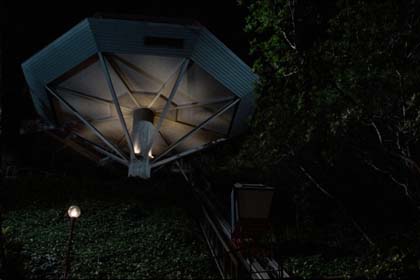 Inspired by the new season of True Detective, Vulture enlisted New York Magazine design expert Wendy Goodman to compile a list of great modernist houses in which Los Angeles villains have taken up residence. (Greg Cwik co-wrote the Vulture article with Goodman.) John Lautner's Chemosphere House, built in 1960, is a prominent setting of Brian De Palma's Body Double, which comes in at number six on the list of eight.
Inspired by the new season of True Detective, Vulture enlisted New York Magazine design expert Wendy Goodman to compile a list of great modernist houses in which Los Angeles villains have taken up residence. (Greg Cwik co-wrote the Vulture article with Goodman.) John Lautner's Chemosphere House, built in 1960, is a prominent setting of Brian De Palma's Body Double, which comes in at number six on the list of eight.